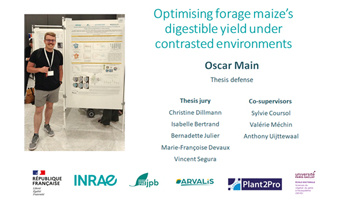Thesis defense: Oscar Main
Optimisation of the digestible yield of forage maize in contrasting environments
Maize stands as a pillar of the French forage system, with its yield and silage feeding value serving as key criteria for the registration of maize hybrid varieties in the official French catalogue. Previous research on this topic has revealed a direct correlation between silage feeding value and dry matter (DM) digestibility, which is, in turn, constrained by cell wall (CW) digestibility and significantly affected by water deficit. Studies on maize inbred lines have shown that under severe water deficit conditions, both DM and CW digestibilities increase. This increase correlates with a decrease in lignin content and changes in lignin distribution. However, it is noteworthy that breeding efforts have already fixed lignin content in hybrid varieties. Therefore, lignin content is unlikely to be a source of future digestibility improvement.
To explore other CW targets and the impact of water deficit on these traits, this PhD study was conducted as part of the Carnot Plant2Pro INRAE-ARVALIS MAMMA MIA project. We grew a range of modern forage maize hybrids representative of the current S0-S1 (very-early to early flowering earliness) French market for two years under sixteen contrasted environmental conditions, including six in controlled irrigation conditions. First, we established a simple but robust stress index (SID) that considers the water deficit in the soil and the air temperature. This SID provided a key environmental ranking tool, highlighting severe stress due to high temperature that significantly impacted DM digestibility compared to moderate stress conditions. Secondly, to encompass a wide range of environmental conditions in biochemical quantifications, we developed several predictive near-infrared spectroscopy (NIRS) equations capable of robustly and accurately predicting fine cell wall traits and relationships, mirroring levels observed in laboratory experiments. While these equations prove sufficiently robust for use in selection programs, we emphasize the need for vigilance in accurately estimating prediction accuracy under stress conditions, particularly in equations applied to hybrid material where trait variation ranges are often limited.
The core dataset of this work enabled a multiscale analysis, integrating agroclimatic, agronomic, biochemical, and histological traits, along with in sacco experimental data on cows. We proposed biochemical and histological traits to improve the quality of forage maize depending on stress intensity. We demonstrated that under severe stress, ear production decreases significantly, but DM digestibility can be maintained by increasing CW digestibility. This boost in CW digestibility was due to a reduction in p-hydroxycinnamic acid content, while lignin content remained stable, as anticipated. The significance of lignin distribution increased with the severity of stress, reaching an extreme threshold where biochemical parameters solely account for digestibility variations. This two-threshold model presents a window of opportunity located at the first threshold between non-stressed and moderately stressed environments, where the increased role of lignin distribution alongside biochemical traits enabled an increase in digestible yield. By controlling irrigation doses in the field under moderate drought conditions and integrating the SID into an irrigation management tool, farmers could exploit this window to increase productivity.
Supervisors:
> Sylvie Coursol - INRAE, IJPB, Versailles, "Biomass Quality and Interactions with Drought" QUALIBIOSEC team
> Valérie Méchin - INRAE, IJPB, Versailles, "Biomass Quality and Interactions with Drought" QUALIBIOSEC team
> Anthony Uijttewaal - ARVALIS
Members of the jury:
> Isabelle Bertrand (Rapportrice) - INRAE, Eco&Sols, Montpellier
> Bernadette Julier (Rapportrice) - INRAE, URP3F, Lusignan
> Christine Dillmann (Examinatrice) – UP-Saclay, INRAE, GQE-Le Moulon, Gif-sur-Yvette
> Vincent Segura (Examinateur) – INRAE, AGAP, Montpellier
> Marie-Françoise Devaux (Examinatrice) – INRAE, BIA, Nantes
To attend, contact Sylvie Coursol or contact Valérie Méchin
Research developed at the Institute Jean-Pierre Bourgin for Plant Sciencess in collaboration.
Back
